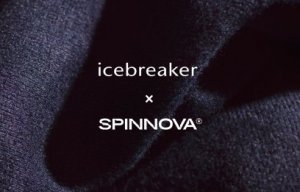
Spinnova and Icebreaker develop circular midlayer products
Merino outdoor clothing pioneer Icebreaker is introducing Baacode, a revolutionary traceability system to enable customers to follow their garments through every step of the production process. Customers are invited to trace Icebreaker's sustainable and ethical practices, beginning at the farm and extending throughout the entire supply chain.Environmental damage and unethical manufacturing standards in the apparel industry are often caused by manufactur

17th August 2008
Knitting Industry
|
Wellington, New Zealand
Merino outdoor clothing pioneer Icebreaker is introducing Baacode, a revolutionary traceability system to enable customers to follow their garments through every step of the production process.
Customers are invited to trace Icebreaker's sustainable and ethical practices, beginning at the farm and extending throughout the entire supply chain.Environmental damage and unethical manufacturing standards in the apparel industry are often caused by manufacturers buying fabric without taking responsibility for how that fabric was produced. Rather than buying from a middle man, Icebreaker takes responsibility for the entire life-cycle of its garments.
Icebreaker sources its merino fibre directly from high country New Zealand farmers, all of whom must comply with stringent guidelines on animal health and welfare, long-term respect for the environment, and fibre quality.
While many companies pay lip service to the environment, Icebreaker CEO Jeremy Moon says sustainability has been a non-negotiable part of the company's core philosophy since it was founded in 1994.
"For Icebreaker, it's not just about where it's made – it's about how it's made," says Moon.
From August 2008, Icebreaker garments will have an internal label bearing a unique Baacode number. A swingtag will tell customers how to enter their individual Baacode on the Icebreaker website and trace the merino fibre in their garment through to the sheep stations where it was grown.
Customers will see the living conditions of the sheep, meet the high country farmers who run the sheep stations, and follow the production process that turns premium merino fibre into Icebreaker's exceptional, performance-driven garments.
"For us, sustainability is about transparency and being able to show the whole design for the business, which starts with the growers and continues through every step of the supply chain," says Moon.
"We made the decision to put this information online to give consumers a clear understanding of Icebreaker, and of our deep and ongoing commitment to the environment and to social ethics."
Launched in 1994, Icebreaker was the first company in the world to develop a merino wool layering system for the outdoors. It was also the first outdoor apparel company in the world to source merino direct from growers, a system it began in 1997. There are now 10 distinct pure merino fabrics in the Icebreaker system, covering underwear, mid layer, and outerwear.
Icebreaker is sold in nearly 2000 stores in 24 countries throughout Europe, Asia, Australasia and North America. Based in Wellington, New Zealand, Icebreaker uses only pure merino hand-picked from 120 high country stations in the country's Southern Alps to create edgy outdoor clothing that combines nature's work with human technology and design.

Business intelligence for the fibre, textiles and apparel industries: technologies, innovations, markets, investments, trade policy, sourcing, strategy...
Find out more